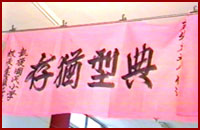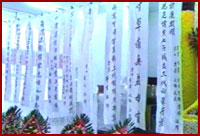 The following is a text transcript of an interview of Yeong-Tsuey Uang conducted by Vicky Chen.
The following is a text transcript of an interview of Yeong-Tsuey Uang conducted by Vicky Chen.
When you were growing up, what did your parents tell you about your ancestors?
The stories were about where my family originated. During the Tai Ping Revolution, the rebels attacked Anhui, and so my ancestors fled to Zhejiang. Afterwards, my family stayed at Zhejiang. One of my ancestors was a government official, but he was very poor because he wasn't very greedy.
From your childhood, what do you remember about attending a ceremony or holiday to worship ancestors?
We did most of our ancestor worship during New Years, and Grave Sweeping Day. We would cook food and place it on the table, and we had six chairs around the table. We also had six glasses of wine, six bowls and six pairs of chopsticks. We also lit incense, and the eldest male leads the ancestor worship. Our family bowed instead of kowtow. After bowing, we would give rice and wine to the ancestors. We burned paper money after three bowings and three offerings. Which is usually after the incenses burned halfway. We would burn the incense with the paper money, and we would pour the wine around the paper money. The females never led the worship. We did the same during Grave Sweeping Day.
How did you feel about attending a chinese funeral?
The funeral I attended was for my grandmother. In traditional Chinese funerals, there are many decorations to represent your sorrow and memories to the deceased. For example, flower wreaths and memorial banners, and they used a lot of flowers to decorate the repository hall. My grandmother is a Christian. Therefore, the whole funeral practice is a mixture of traditional Chinese customs and Christian religious procedures. My grandmother died at the age of 98. When a person died after age 80, this is a person with long life. This person should be proud of himself (or herself). Therefore, the funeral would be different from an ordinary procedure. For example, in ordinary funeral practice, all the things used in the ceremony are white. In a funeral for a person who died after the age of 80, there would be some red (color of good luck) in the decoration. Using both white and red colors in the practice expresses the mixed types of feeling (sorrow and happiness). To represent joyful feelings, people would write memorial banners on red paper instead of white cloth. Therefore, banners on either red or white fabrics were used in my grandmother's funeral.


 Many friends also sent flower wreaths in memory of my grandmother. You can tell that the flower wreath decorated with red flowers is a sign the deceased died after age of 80.
Many friends also sent flower wreaths in memory of my grandmother. You can tell that the flower wreath decorated with red flowers is a sign the deceased died after age of 80.
 The hearse carrying the coffin is also decorated. The cross is a sign indicating my grandmother is a Christian. Again, the red flower balls hanging at each corner and window are signs that the deceased died after age of 80.
The hearse carrying the coffin is also decorated. The cross is a sign indicating my grandmother is a Christian. Again, the red flower balls hanging at each corner and window are signs that the deceased died after age of 80.
In ordinary funerals, using red in the practice would be considered as a very impolite behavior.
 The front of the hall is all decorated with flowers and a picture of my grandmother is hanging in the center. Because my grandmother is a Christian, therefore, burning canal, paper money and joss-stick (things commonly seen in Chinese funeral) are not used in the ceremony.
The front of the hall is all decorated with flowers and a picture of my grandmother is hanging in the center. Because my grandmother is a Christian, therefore, burning canal, paper money and joss-stick (things commonly seen in Chinese funeral) are not used in the ceremony.
 At the beginning of the ceremony, to show respect, all the children and grandchildren entered by crawling.
At the beginning of the ceremony, to show respect, all the children and grandchildren entered by crawling.
 First, we would bow and kowtow nine times to represent our respect to the deceased.
First, we would bow and kowtow nine times to represent our respect to the deceased.
 Then, one of the children read a memorial essay to express the family's feelings toward the deceased.
After the ceremony, the closest families and friends carried the portrait of the deceased and they would go to the burial site where the coffin is buried, and people would say prayers.
Then, one of the children read a memorial essay to express the family's feelings toward the deceased.
After the ceremony, the closest families and friends carried the portrait of the deceased and they would go to the burial site where the coffin is buried, and people would say prayers.
Do you think that Chinese traditions are important to you?
Well, I really don't know. It's hard to say. I think the good ones are important, but not all of the traditions are good. All the attention to detail is unnecessary. What's important is what a person feels inside, and not all those detailed actions.
In what ways do Chinese traditions affect you personally?
When I was growing up, I was exposed to how my parents acted, which affects how I act daily. I may act according to Chinese traditions unknowingly.
In what ways do you think Chinese traditions apply to, or are important to, Chinese-Americans nowadays?
I think that the meaning behind Chinese traditions is important, such as family relationships and morals, and the procedures in how these traditions are carried out aren't as important as the meaning.
Have you or will you teach these ceremonies or rituals to your children?
If they are willing to learn, then I will teach it to them; if not, I won't force them to learn.
back to interviews